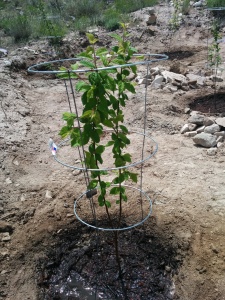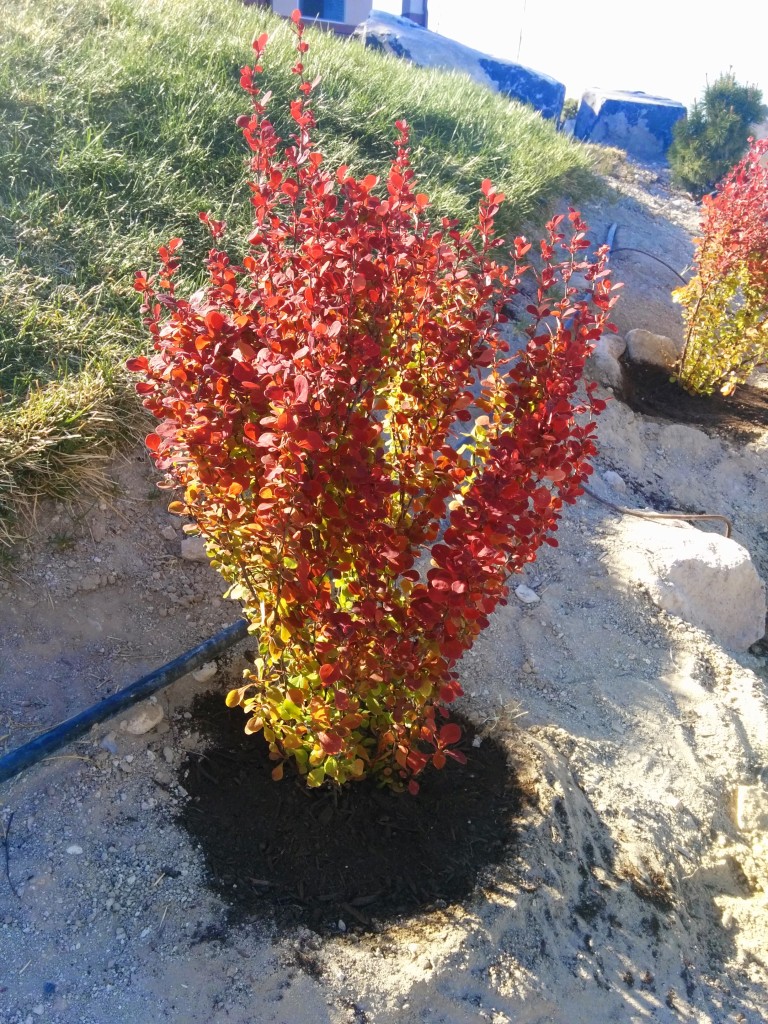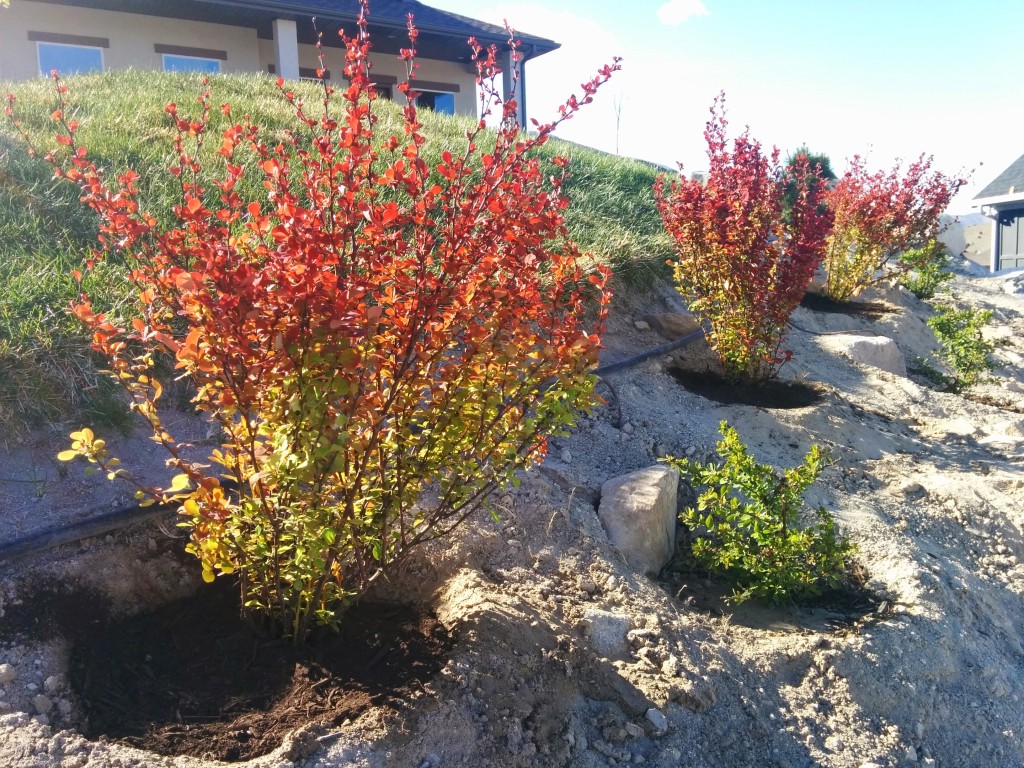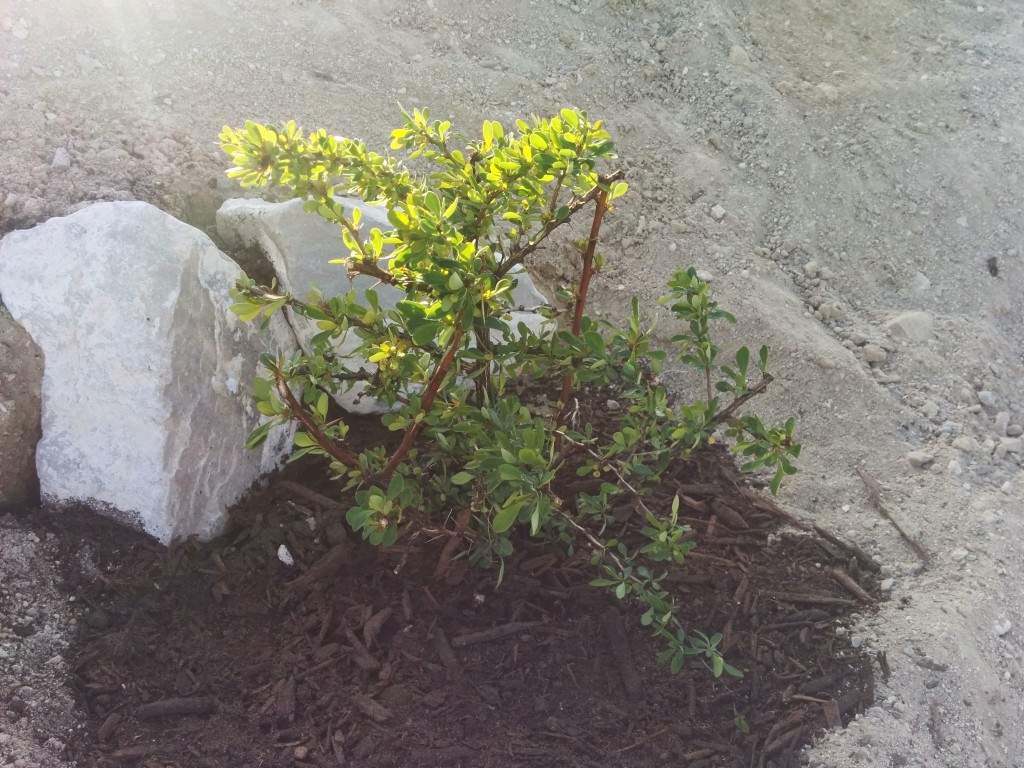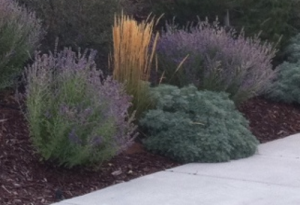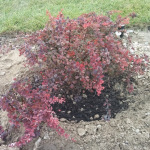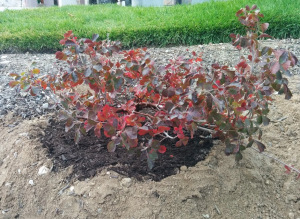The Utah Conservation Districts of Utah County will be holding their annual Spring seedling tree/shrub sale. Trees can be ordered anytime between now and April 15, 2016. (Friday) or until sold out. The seedlings will be available Friday/Saturday April 22-23, in two Utah County locations. If you have any questions please feel free to contact Keith at 1-801-377-5580 x121.
Author Archives: Mark
Nanking Cherry
Back in February 2015 we ordered five bare root Nanking Cherry plants (Prunus tomentosa) from the Timp-Nebo/Alpine Tree sale. We received them in mid April. We planted them right away in 1 gallon pots and they leafed out pretty good. We got around to planting them in the ground at the end of May. We’ll add some chicken wire around the tomato cages to keep the rabbits and deer away while the plants get a start.
They are said to grow 6′-10′ tall and up to a 15′ spread. We didn’t leave enough room for that kind of growth, but we’ll deal with when and if they grow. They should grow 1′-2′ per year.
- Adapts well to cold winters, hot summers and drought.
- Blooms in early spring, with pink buds opening up into fragrant pale pink or white flowers.
- The cherries are tart and tangy scarlet-colored and can be eaten fresh or used in pies, jams and jellies.
- Two or more shrubs should be planted within 100′ of each other to ensure cross-pollination. It isn’t self-fertile.
- Can be planted 4–5′ apart to form a hedge.
- Adapts to a variety of soil conditions and pH levels. It prefers well-drained soil but will tolerate drought and can grow in semi-arid conditions.
I’m anxious to see what kind of cherries we get off these $3 plants.
Orange Rocket Barberry
The Orange Rocket Barberry starts out coral-orange/red in the Spring, green in the summer and ruby red in the Fall. They grow up to 4-1/2′ tall and 1-1/2′ wide.
- Height: 4-1/2′
- Width: 1-1/2′
- Full Sun/Partial Sun
Pros
- Pros: Deer Resistant.
- Makes a good hedge
Cons:
- Thorns – sharp thorns.
- Lots of color in the Spring and Fall.
Lime Glow Barberry
Lime Glow Barberry can grow up to 5′ tall and 4′ wide. It is a slow grower and will need regular watering when it is hot. It should turn a brilliant red in the Fall, I can’t wait to see it and get some pictures on here.
- Height: 5′
- Width: 4′
- Full Sun
Pros
- Deer Resistant
- Leaves can handle the sun, some light green/yellow barberries do not
Cons
- Thorns (this can be a plus if you want to deter people from an area)
- Slow growing
2015 Eagle Mountain Tree & Shrub Sale
You can get some great deals right now on seedling trees and shrubs. This is through the Utah Association of Conservation Districts. Look for the link to the Timp-Nebo/Alpine Tree Sale. Bundles of 5 are priced from $10 to 17.50. They won’t ship so you’ll have to pick them up – somewhere in Utah County – it doesn’t say where. Orders will be available April 17th or 18th. When I checked the site, this is what was available, but they are sold first come first serve.
Evergreen Trees
Colorado Blue Spruce, Atlas Cedar, Mugo Pine
Deciduous Trees
Littleleaf Linden, Siouxland Cottonwood (cottonless), Amur Maple, Eastern Red Bud, Thornless Honey Locust
Shrubs
Dwarf Almond, Cotoneaster, Chokecherry (½ tree, ½ shrub), Common Purple Lilac, Common Privet, Redosier Dogwood, Forsythia, Buffaloberry, Nanking Cherry, Siberian Pea Shrub
We are going to try the Amur Maple, Nanking Cherry, Purple Lilac, Forsythia and Mugo Pine. We’ve had great luck with Mugos. We had one Forsythia that didn’t do great, but we are going to try it again in a spot with more sun.
Russian Sage
Russian sage thrives in the heat, tolerates poor soil and is resistant to deer and pests. It looks good with succulents and ornamental grasses. When we were planting I stepped on one of the 3″ plants we bought and broke it down to a 1/2″ stem with a single leaf. It didn’t bother it one bit. By the end of the summer that plant was full-size like the rest. It grows great int the rocky, alkaline soil in Eagle Mountain. Sounds good right?
Here is why I’ll never plant it again. It spreads. It sends roots out 20-30′ to pop up a new plant and it just won’t die. It is nearly impossible to remove from a yard. You’ve been warned.
Russian sage with purpler flowers. Also in the photo, Artimis Powis Castle, and an ornamental grass.
- Height: 3-4′
- Width: 3-4′
- Sun: Full sun
- Flowers: Summer
- Low water requirements
Dwarf Blue Leaf Arctic Willow
The Arctic Willow grew well in Eagle Mountain. You can prune and shape them to keep the size down, but it will make you work for it for a few years.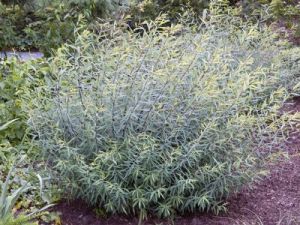
Don’t let the dwarf name fool you. I’ve listed the sizes here according to what we saw in our yard. They are always advertised in the 3-5′ range, but it isn’t uncommon for them to be much larger.
- Sun: Full to partial
- Height 5-6′
- Width 5-8′
- No flowers
Rose Glow Barberry
Rose Glow Japanese Barberry can grow up to 5′ tall and 4′ wide, but it is a slow grower. It will need water weekly or more often in the heat.
- Height: 5′
- Width: 4′
- Full Sun
Pros
- Pros: Deer Resistant.
- In a mild winter they will keep many of the leaves and berries so you can have some winter color.
Cons:
- Thorns – sharp thorns.
